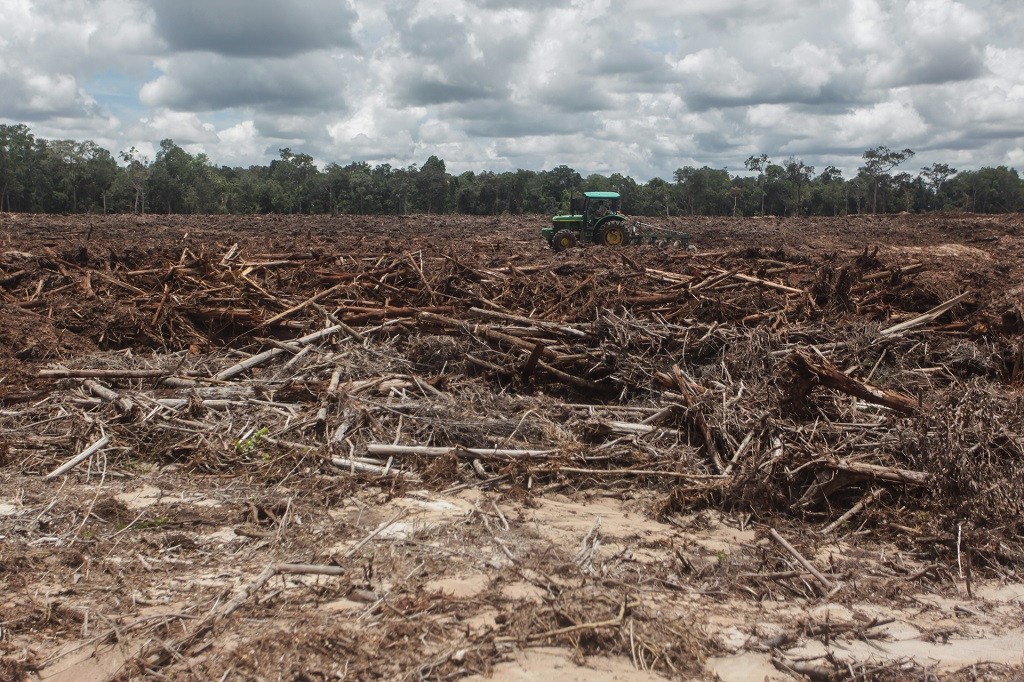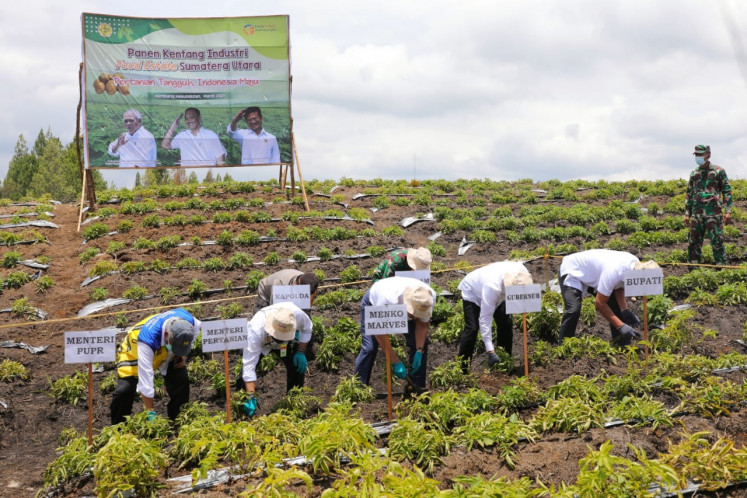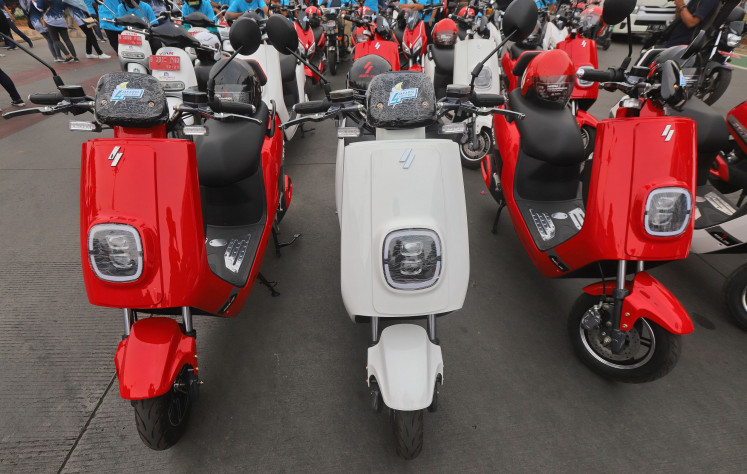Food estate expansion raises environmental concerns
Environmentalists contend that the project will damage peatland and forests, causing wider-reaching problems for the environment.
Change text size
Gift Premium Articles
to Anyone

I
n response to successful first harvests of the country’s recently developed food estates, the government is planning to expand the agricultural program, raising concerns about its environmental impact and ability to address food security issues.
The government reported in March that 215 hectares of the Humbang Hasundutan food estate in North Sumatra had seen their first harvests. Some 100 ha of shallots, 50 ha of garlic and 50 ha of potatoes had been planted.
Per hectare, the estate yielded 15 tons of potatoes, 5.8 tons of shallots and 5.8 tons of garlic – figures that the government said were above the national average.
The government is now planning to expand the North Sumatran food estate by up to 1,000 ha by the end of year. Coordinating Maritime Affairs and Investment Minister Luhut Binsar Pandjaitan said the agricultural area would be expanded to 20,000 ha by 2024.
A similar food estate in Pulang Pisau regency, Central Kalimantan, recently yielded nearly 54,000 tons of rice, a quantity the government considered a success.
President Joko “Jokowi” Widodo’s administration is developing the estates to address food supply and distribution issues that were exacerbated by the COVID-19 pandemic.
Threated peatland and forests
But civil and environmental groups have criticized the project and the government’s plan to expand it, as they have found that most food estates are being developed in forests or on peatland.
The government has established four areas of interest for the food estate project: around 61,000 ha in North Sumatra, 311,000 ha in Central Kalimantan, 3.3 million ha in Papua and 32,000 ha in South Sumatra.
But the Madani Foundation has found that some 92 percent of the proposed food estate land is forested.
“Damage to wetlands might cause forest and peatland fires, leading to the emission of greenhouse gases that would exacerbate the climate crisis. Meanwhile, destroyed forests would only hinder agricultural activities and cause further food crises in the future,” Madani Foundation researcher Anggalia Putry said.
While the government claims to have complied with strategic environmental assessments (KLHS) in the development of the estates, she added, there was lack of evidence that authorities had actually conducted such studies. Anggalia said the program should be transparently monitored and evaluated.
Pantau Gambut coordinator Iola Abas said most of the land for the food estate in Central Kalimantan was peatland managed under the government’s Peatland Development Project (PLG).
The project was initiated in the 1990s under then-president Suharto and sought to develop 1.4 million hectares of rice fields on peatland in the province. But the project failed to reach its goals.
“The peatland has not fully recovered. It still needs rewetting, revegetation and full restoration as a hydrological unit,” Iola said recently.
The group found that peatland managed under the PLG was also prone to fires. According to Pantau Gambut’s analysis of Environment and Forestry Ministry data, some 265,000 ha of former PLG land burned in the 2015 wildfire season.
The North Sumatra chapter of the Indonesian Forum for the Environment (WALHI) warned that the development of food estates would also carry social risks for nearby residents, as the estates could trigger agrarian conflict and diminish the value of local crops and commodities.
“Lake Toba could also be polluted by chemical fertilizer and pesticide as the [food estate] is near the shore of the lake,” North Sumatra WALHI director Dani Lauparisa said.

Below-target harvests
While authorities celebrated the yields of the food estates, some farmers have claimed that the harvests were actually lower than targeted.
Heriyanto, a farmer from the Sido Mekar farming group in Belanti Siam village, Pulang Pisau, said authorities demanded that the group plant rice earlier than than usual. The farmers were also instructed to plant three cycles of rice rather than the usual two.
The changes made the seeds more susceptible to extreme weather and pests, Heriyanto claimed.
The group, which had been farming in Belanti Siam since 1982, after a wave of transmigration to the region, was also asked to switch rice seeds.
Heriyanto, who arrived as a migrant in 1982, said he had only harvested 1.2 tons of rice per hectare under the food estate program. Previously, the farmers could harvest up to 5 tons per hectare.
“While they initially grew well, most of the seeds failed to [produce rice that could] be harvested,“ Heriyanto told The Jakarta Post on Thursday. “The government wanted to help local farmers here, but their plan didn’t work here.”
The Central Kalimantan Food Crops, Horticulture and Husbandry Agency dismissed the farmers’ claims, saying that the low yield had been caused by natural occurrences, such as extreme weather and disasters, kompas.com reported.
Indonesia ranks 65th of 113 countries surveyed for the Economist Intelligence Unit’s 2020 Global Food Security Index. While the country fared quite well in the availability and affordability categories, it performed poorly in quality and safety, as well as natural resources and resilience.
The “quality and safety” criterion measures the variety and nutritional quality of average diets as well as the safety of food. Meanwhile, the “natural resources and resilience” criterion assesses a country’s exposure to the impacts of climate change, its susceptibility to natural resource risks and how it is adapting to these risks.
“Reflecting on the index, food stock was not actually our problem. The food estate is the wrong response, which might create new problems in the future,” Pantau Gambut’s Iola said.
Indonesian Farmers Union chairman Henry Saragih suggested that the government intensify agricultural activity on existing cultivated land rather than developing new farmland. “Even if we create new areas, they should be integrated with agrarian reform and food sovereignty programs.”









